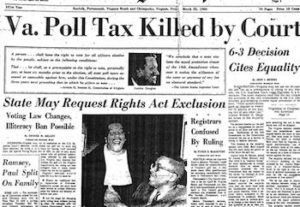
Newspaper clipping
*On this date in 1966, Harper v. Virginia Board of Elections, 383 U.S. 663 (1966), was decided. This was a case in which the U.S. Supreme Court found that Virginia's poll tax was unconstitutional under the equal protection clause of the 14th Amendment.
In the late 19th and early 20th centuries, eleven southern states established poll taxes to disenfranchise most blacks and many poor whites. The Twenty-fourth Amendment to the United States Constitution (1964) prohibited poll taxes in federal elections, but five states (Alabama, Arkansas, Mississippi, Texas, and Virginia) continued to require poll taxes for voters in state elections.
Justice Hugo Black filed a separate dissent. Black based his dissent mainly on stare decisis. As a textualist, he also criticized the majority for expanding the meaning of the Fourteenth Amendment by using what he called the old "natural law due process formula." He emphasized that new meanings can be added to the Constitution only through amendments. By this ruling, the Supreme Court banned poll taxes in state elections.